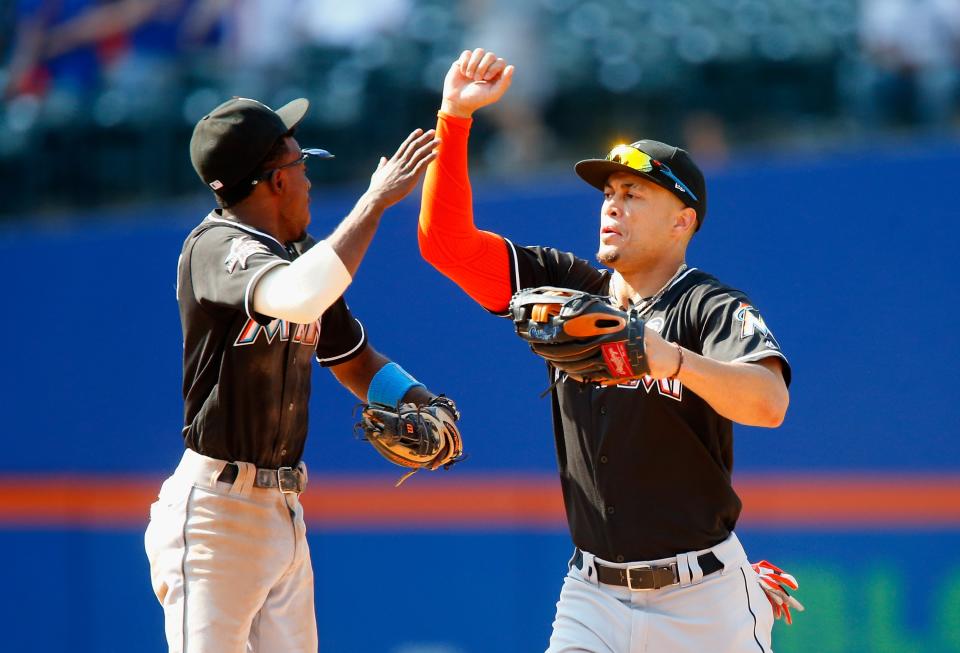What Dee Gordon's trade means for Shohei Ohtani and Giancarlo Stanton
Somewhere between Jerry Dipoto’s effervescent roster scheming and Giancarlo Stanton’s career dilemma and Derek Jeter’s paper debt and Shohei Ohtani’s budding U.S. career and MLB’s rules on international spending stood Dee Gordon, innocent bystander (and second baseman) until Thursday afternoon.
In an otherwise sedentary early going to baseball’s offseason (through no fault of the Seattle Mariners general manager), Dipoto traded three minor leaguers to the Miami Marlins for Gordon, the former batting champion owed $38 million over the next three seasons. As the Mariners already have a second baseman – Robinson Cano, due $24 million annually through 2023 – the assumption is Gordon will become a center fielder.
The Mariners will pay all of Gordon’s salary. The Marlins also sent $1 million in international bonus pool money to the Mariners, who just Wednesday night traded a minor-league catcher to the Minnesota Twins for another $1 million in international money. Those two trades brought their total – at the moment – to $3.56 million, a few thousand more than the Texas Rangers, which would hardly be important to anyone except it suddenly seems important to everyone, or certainly everyone with still a stake in Ohtani.

The interwoven and yet not entirely complex being that delivered an outfielder’s glove to Gordon’s doorstep, his experience with one of those limited to 13 games in the Dominican winter league four years ago, starts of course with the Marlins.
After rescuing the franchise from Jeffrey Loria, new ownership, Jeter out in front, seems determined to cleave the payroll, perhaps by a lot. That started with Stanton, currently with an opportunity to waive his no-trade protection to one of of four reported teams, and by extension get Marlins’ ownership rolling on its long-term plan. Stanton seems hesitant, as he should be, as being boinked out of town at the sharp end of a new rebuild is no way to treat an MVP. Dealing one of the team’s productive and higher-paid players in Gordon, also a good friend of Stanton’s, looks additionally like a message that if he resists a trade, Stanton will return to a team that is both unrecognizable and non-competitive, and ain’t life grand.
Then, to the Mariners, along with The Other Six, those being the teams invited to Los Angeles this week to recruit Ohtani, whose bonus is limited to allotted international pools. That was fine, it was said, because Ohtani already was passing up tens of millions of dollars in order to start his MLB dream at 23 years old. The Texas Rangers had the most pool money, at roughly $3.5 million. Still, it was said, a negligible advantage, for the above reasons. Ohtani sought opportunity and comfort and a place to ply his two-way skills first. Then, as Ohtani mulled his seven options, the Mariners traded for $1 million to bring their total to $2.56 million. Then the Los Angeles Angels traded for another $1 million (a week after acquiring $1.2 million from the Atlanta Braves), so they had $2.32 million to offer. Then the Mariners added another $1 million, which brought them to $3.56 million. And what appeared to be insignificant had the looks of a bidding war. (The four National League teams alive – Los Angeles Dodgers, San Diego Padres, San Francisco Giants, Chicago Cubs – are sitting at or around $300,000.) It remains to be seen whether Gordon, a fine player who the Marlins didn’t want to pay anymore, came with the international money or vice versa.
So Gordon will go to Seattle, earnestly learn his new craft, and perhaps become a capable center fielder, even perhaps while standing to the right of Shohei Ohtani. And the Marlins, with any luck, will pay down their debt at the cost of a good portion of their community’s goodwill, whatever was left of it. And Stanton, with any luck, will find happiness and decorum in a new town, perhaps his hometown of Los Angeles. And, as for The Other Six, they may have been left behind in a bidding war few of them knew existed, right up until Dee Gordon got swept up in it all.
More MLB coverage from Yahoo Sports:


